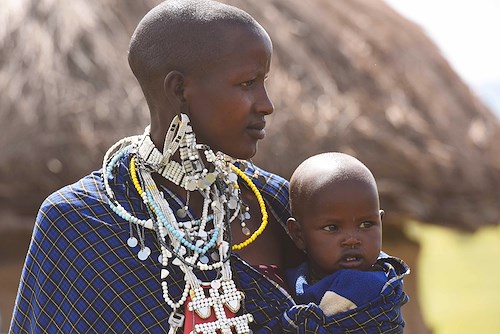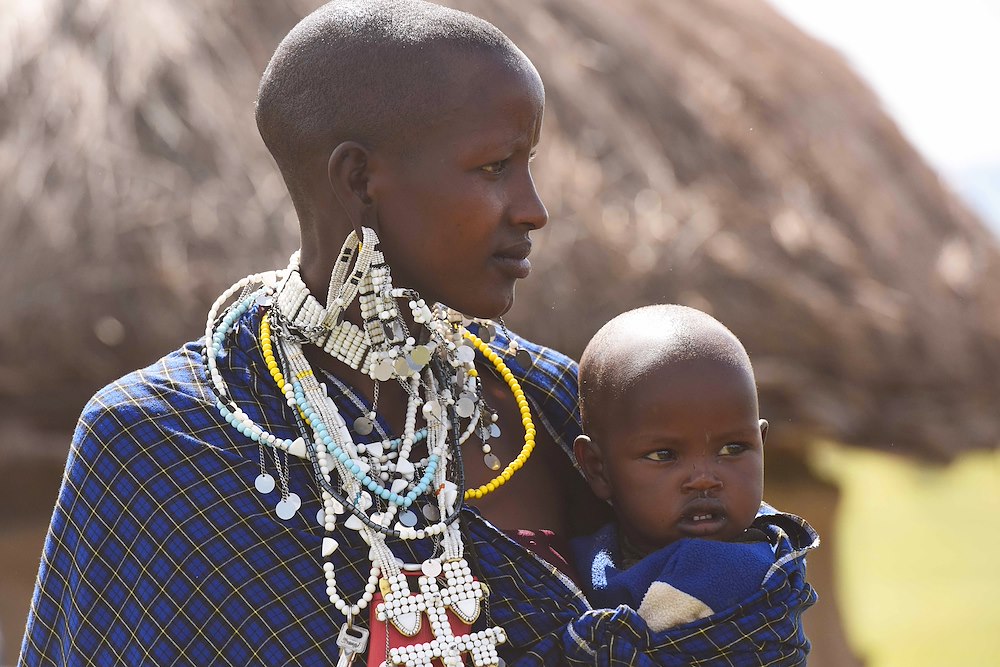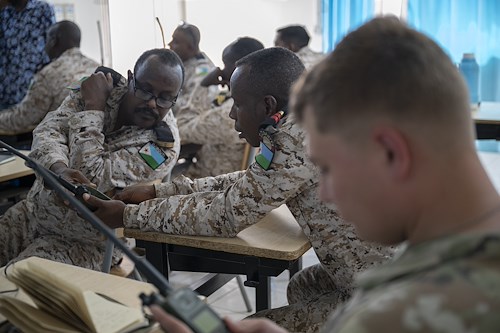Gallery contains 8 images
×
Photo 1 of 8
Combined Joint Task Force - Horn of Africa Image
A mother from the Maasai tribe holds her child May 21, 2015. During a culture day of a Gender Mainstreaming seminar, attendees visited the Maasai Village to experience their culture, traditions and lifestyle. (U.S. Air Force photo by Staff Sgt. Maria Bowman)
Photo by: Staff Sgt. Maria Bowman
Photo 2 of 8
Combined Joint Task Force - Horn of Africa Image
U.S. Army Africa co-hosted a Gender Mainstreaming seminar May 18-22, 2015 in Arusha, Tanzania. Military personnel and key leaders from 16 nations attended the event, which emphasized the importance of gender mainstreaming and promoting equality throughout the region. (U.S. Air Force photo by Staff Sgt. Maria Bowman)
Photo by: Staff Sgt. Maria Bowman
Photo 3 of 8
Combined Joint Task Force - Horn of Africa Image
A Maasai boy watches visitors from a Gender Mainstreaming seminar during their culture day in Tanzania May 21, 2015. The Massai tribe lives near many game parks of the African Great Lakes, and are known for their distinctive customs and dress. (U.S. Air Force photo by Staff Sgt. Maria Bowman)
Photo by: Staff Sgt. Maria Bowman
Photo 4 of 8
Combined Joint Task Force - Horn of Africa Image
U.S. Navy Cmdr. Kimberly Walz, Combined Joint Task Force-Horn of Africa Theater Security Cooperation deputy director, interacts with Maasai Tribe members during the Gender Mainstreaming Seminar cultural day May 21, 2015 in Tanzania. The tribe welcomed their visitors with singing and dancing. (U.S. Air Force photo by Staff Sgt. Maria Bowman)
Photo by: Staff Sgt. Maria Bowman
Photo 5 of 8
Combined Joint Task Force - Horn of Africa Image
Representatives from the U.S. and 15 African nations discuss a variety of topics concerning gender equality during the 2015 Gender Mainstreaming Seminar in Aurusha, Tanzania, May 19. U.S. Army Africa co-hosted the conference with the Tanzanian People’s Defense Force, in an effort to frame the importance of gender mainstreaming and promote equality throughout the region. (U.S. Air Force photo by Staff Sgt. Maria Bowman)
Photo by: Staff Sgt. Maria Bowman
Photo 6 of 8
Combined Joint Task Force - Horn of Africa Image
Maasai Tribe members put on a dance performance for the visitors from the Gender Mainstreaming seminar, during their culture day May 21, 2015. The Massai tribe is a group of semi-nomadic people inhabiting southern Kenya and northern Tanzania. (U.S. Air Force photo by Staff Sgt. Maria Bowman)
Photo by: Staff Sgt. Maria Bowman
Photo 7 of 8
Combined Joint Task Force - Horn of Africa Image
Xavenialinda Kisanga, from the Tanzania People’s Defence Force, visits a Maasai village in Tanzania, May 21, 2015. Gender Mainstreaming Seminar attendees went to the village to see its inhabitants’ clothing, living arrangements and dancing, as part of a cultural day. (U.S. Air Force photo by Staff Sgt. Maria Bowman)
Photo by: Staff Sgt. Maria Bowman
Photo 8 of 8
Combined Joint Task Force - Horn of Africa Image
Gender Mainstreaming Seminar attendees visit the Maasai Village during the Gender Mainstreaming Seminar cultural day May 21, 2015 in Tanzania. The Massai tribe is a group of semi-nomadic people inhabiting southern Kenya and northern Tanzania.
Photo by: Bowman, Maria R. CIV
Representatives from Combined Joint Task Force-Horn of Africa attended a Gender Mainstreaming Seminar recently in Arusha, Tanzania.
The seminar provided an opportunity for the CJTF-HOA personnel to collaborate with their East African partners and share issues they are currently facing or solutions they have come up with, in order to bring about gender equality within military and government organizations.
“Many of the countries include gender integration and equality as principals in their constitution,” said U.S. Navy Cmdr. Kimberly Walz, CJTF-HOA Theater Security Cooperation deputy director. “Many countries use gender mainstreaming as a way to provide peace and trust for their people.”
Gender mainstreaming is a priority for the U.S. military and its partner nations. U.S. Army Lt. Col. Keary Johnston, CJTF-HOA deputy surgeon, said the conference was about sharing best practices, lessons learned and ideas for the way forward. The ultimate goal is a military that reflects the society without compromising quality.
“The U.S. military definitely has a long way to go to reach the same integration of many of our partner nations,” Johnston said. “We now have a better understanding of the baseline of many of our partner nations as to gender mainstreaming. We also know where they want to be and how they are getting there.”
U.S. Marine Cpl. Justine von Rumpf, Joint Operation Planning and Execution System noncommissioned officer, said she was grateful for the opportunity to attend the seminar because it allowed her to see a bigger picture of where many of CJTF-HOA’s African partner nations are at in their gender integration initiatives.
“In many ways, our African partners are more advanced in terms of gender mainstreaming than we are as a country, and we can learn from them,” said von Rumpf. “The country briefs showed each country taking an active role in changing their culture as a whole, by first changing their military cultures.”
During the Tanzanian culture brief, retired Tanzania People’s Defence Force Maj. Gen. Lillian Kingazi said that it is her nation’s goal for women to not play a supplementary role to men, but constitute a full-fledged membership to the military organization.
“We must sensitize leadership on the importance of gender mainstreaming and adopt gender specific policies,” said Kingazi. “The success of utilizing women depends on leadership that is committed to change.”
Toward the end of the seminar, attendees had the opportunity to visit the Maasai Village and see the huts they live in, the vibrant clothing they wear and experience their famous culture. It was the highlight of the event, according to von Rumpf.
“Cultural day was amazing because it gave me a deeper appreciation of how important our African partners view culture,” von Rumpf said. “Each nation may have its own different practices and beliefs, but they very much value their culture and traditions from the past. It guides their law making process and the way they think. The Maasai Village is right near modern society, but chooses not to integrate. They hold on dearly to the culture and life of the past.”
Walz said relationships are stronger than institutions in Africa, and one benefit of going to the seminar was to foster bonds between leadership from all the attending nations.
“The network that developed during the conference is a great support network of people who are working to a common purpose,” Walz said. “HOA has expanded our outreach to partner militaries and, through this, we will be able to develop trust and enduring relationships.”
Michael Conteh, a professor from Michigan State, said that the U.S. and the African nations have made some good progress with gender mainstreaming, but that they have a long way to go. He emboldened attendees to stay on the path they have already set upon.
“Be the change you want to see,” said Conteh. “I hope we continue the conversation. Let’s not give up. When we don’t give up, we do not fail.”





























